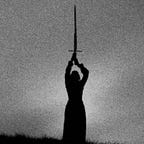The Prophet – Love, Work, Freedom and Sins
“When Love beckons to you, follow him, Though his ways are hard and steep.”
Al Mustafa peered into the deep seas, awaiting the ship that would carry him back home after twelve long years. As he prepared to bid adieu to Orphalese, the town that sheltered him through the duration of his exile, he is stopped by the people of the town. They have seen his wise gaze befall the soil of Orphalese and they know that he carries profound wisdom. They plead with him, to delay his departure so that he can talk to them about life. About love and marriage, about pain and passion, about good and evil.
“In your aloneness, you have watched with our days, and in our wakefulness, you have listened to the weeping and the laughter of our sleep.
Now, therefore, disclose us to ourselves and tell us all that has been shown to you of that which is between birth and death.”
What follows is captured in twenty-six pieces of poetry that constitute the Prophet by Kahlil Gibran. Though the story of Al Mustafa is a fable, most of what he says is hauntingly real.
When it was published in 1923, critics were quick to dismiss it as naive and simplistic. Yet it continues to be infectious in its reach, catapulting Gibran to the ranks of bestselling poets. It is one of the most translated works in history.
And it has never been out of print.
The Prophet speaks to the predicament of being human. It talks about all those things we seek counsel for. And perhaps that’s why it is so often quoted in weddings and funerals and makes for the perfect gift — because every person can find a little bit of themselves in the words of Mustafa.
And despite its immense popularity, one shouldn’t mistake the verses as a simplistic rendering of advice. It beckons the reader to return yet again when the heart has ripened with experiences and the mind scampers for solace. In the midst of that distress, meaning shines forth and insight is achieved and the light begins to reveal itself.
“You are good when you strive to give of yourself. Yet you are not evil when you seek gain for yourself.”
In a world where love is transactional, Gibran calls it“ the moving sea between the shores of souls.” Instead of being fettered in a bond, it seeks freedom as an outpouring that mightily gushes forth.
“Give your hearts, but not into each others keeping. For only the hand of Life can contain your hearts.
And stand together yet not too near together.
For the pillars of the temple stand apart, And the oak tree and cypress grow not in each other’s shadow.”
The lessons to be learnt are abundant and each one will grow with the passage of time. Here, I’d like to spend a while discussing three perspectives I found to be particularly illuminating.
On Work
Work is often seen to be dreadful, a means to a selfish end. But Gibran changes this narrative when he says —
I say to you that when you work you fulfil a part of earth’s furthest dream, assigned to you when that dream was born.
He converts drudgery into beauty, giving it a greater and more universal purpose. It is as if, every act, however insignificant it may seem, has its own place in the grander scheme of things. The longing you feel to express, to work, to create is the longing of nature and through you it manifests into existence.
If every action is laced with the tender gentleness of love, work transforms into worship.
And what is it to work with love? It is to weave the cloth with threads drawn from your heart, even if your beloved were to wear that cloth. It is to build a house with affection, even as if your beloved were to dwell in that house.
Work is love made visible.
On Wrongdoers
When faced with those who have done something wrong, we often respond with exasperation, unable to understand why someone would act in such a manner.
Oftentimes have I heard you speak of one who commits a wrong as though he were not one of you, but a stranger unto you and an intruder upon your world.
The evil we denounce may as well be the frailty of our beings, found not only in a select few, but in all of us. The difference between us and the “Sinner” is often never more than a sliver, separate by a circumstance beyond our control. Yet neither does God abandon us nor does the devil adopt us.
It doesn’t make us irredeemable.
Only then shall you know that the erect and the fallen are but one man standing in twilight between the night of his pigmy self and the day of his god self.
The corner stone of the temple is not higher than the lowest stone in its foundation.
On Freedom
Often, the pursuit of freedom in itself can become the greatest hurdle. Gibran is not talking about freedom in the political sense, but rather in the personal self – an individual’s path towards emancipation which is achieved not when the chains melt away but when we learn to rise even as chains gnaw at our flesh.
You shall be free indeed when your days are not without a care nor your nights without a want and a grief. But rather when these things girdle your life and yet you rise above them naked and unbound.
If you enjoyed reading this, you might also want to check out my YouTube channel:
https://youtu.be/U7TbjcOuj8w
